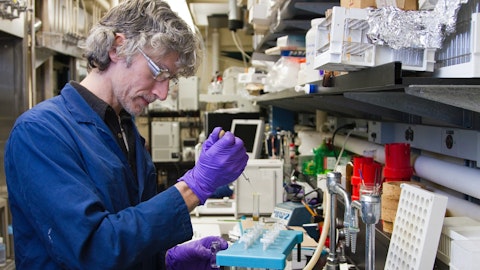I’m willing to sort of say and speculate at this point that we will be looking carefully over the data that matures in the coming months from the field and learning what we can learn about inroads being made into other indications. Of course, lupus is the indication in which the clearest clinical proof of concept exists, and so we’ll be carefully paying attention to that. The design of the study, again, we’ll get into that as we get a little bit closer, but related to Tyler’s question before, we are very much looking at how far we can push this lymphodepletion reduction as we can, including potentially testing no lymphodepletion at all. So, stay tuned for more details on the clinical development plan as we get a little bit closer to the launch of the program in early 2025.
Operator: Thank you. Our next question comes from the line of Brian Cheng of JPMorgan. Your line is open, Brian.
Brian Cheng: Hey, guys. Thanks for taking my questions today. We’re curious if you can walk through your latest thinking around the Phase 1 for ALLO-329. Specifically, how many doses do you plan to execute? Are you doing dose escalation in autoimmune patients? And if so, which indications should we expect since there are quite a few players now already in indications like Lupus and Myasthenia Gravis. Thank you.
David Chang: Hey, Brian. Dave Chang. I’ll take that question. Great question. What I can say is stay tuned. In terms of, steps of those escalation and lymphodepletion, I believe those are details that given our team’s track history in conducting the clinical studies, they can execute those pretty well. I more like to think about the objective to start the Phase 1 study with 329. I mean, the three things that we have called out, the differentiation coming from being able to go after B cells and T cells, that’s more of a biologic clinical question that needs to be addressed through the conduct of studies and going after different indications. But also, as we have called out, one of the important questions that we want to answer is whether we can administer ALLO-329 would reduce or with no lymphodepletion and have the same type of immune resetting phenomena.
I think that will be really the focus of how we design the Phase 1 study. And of course, trying to get that answer as quickly as possible, I mean, that leads to a couple of different study designs, but all these things are being discussed right now.
Operator: Thank you. All right, please stand by. Our next question comes from the line of Michael Yee of Jefferies. Your question, please, Michael.
Unidentified Analyst: Hi. This is Mac on from Michael. I was wondering, switching away from the autoimmune focus, thinking about the first line study for ALPHA3, how do you ensure that you’ll be able to enroll this study? And I guess what gives you confidence in your ability to enroll the study in a timely fashion. I guess as a corollary, when would we be able to expect some initial data from these patients? Thank you.
Zachary Roberts: Hey, Matt. This is Zach. Thanks for the question. So, as far as the first part of your question, why are we confident that this study will be able to be enrolled quickly. In a word, enthusiasm. I think what we have seen so far as we have reached out to investigators across the treatment spectrum from academic KOLs who have been part of the CAR T story for 10, 15 years, all the way to community oncology practices that have a large volume of patients but have not yet made the jump into CAR T, the response to the study has been uniform and it’s been extremely positive. And we are seeing levels of engagement from investigators clearing obstacles to open the program as quickly as they can. We’ve seen that left and right.
So there is a palpable level of enthusiasm around this concept, really driven by the possibility of curing patients after front line and preventing a relapse from ever occurring. This is a very novel and innovative approach to studies in LBCL and people are really excited to be part of that. As far as data goes, as we get a little bit closer to the start of the study and midyear of this year, I think we’ll be in a position to provide a little more clarity on when enrollment is going to complete and when data will be available. What we have said, and I’ll reiterate here, is that the study is designed to have an interim analysis that is currently slated for middle of next year when we will examine MRD conversion from positive to negative, everybody that comes into the study will be MRD positive.
So we’re looking for evidence of clearance of MRD as well as safety and translational outcomes and we will use that interim analysis to select the lymphodepletion arm that will be carried forward for the rest of the accrual period. So as we pass through that gate, we will make a modification to the study design, and that will be plainly visible to all who are paying attention. We will not, however, be able to share granular detail from that analysis because this study is pivotal from the very first patient that’s enrolled. And so all of these patients starting, again, middle of this year, will count towards the overall [N] (ph) that’s required for the pivotal study. So lest we jeopardize trial integrity by sharing those results, we will not be sharing a data update at the middle of next year.




